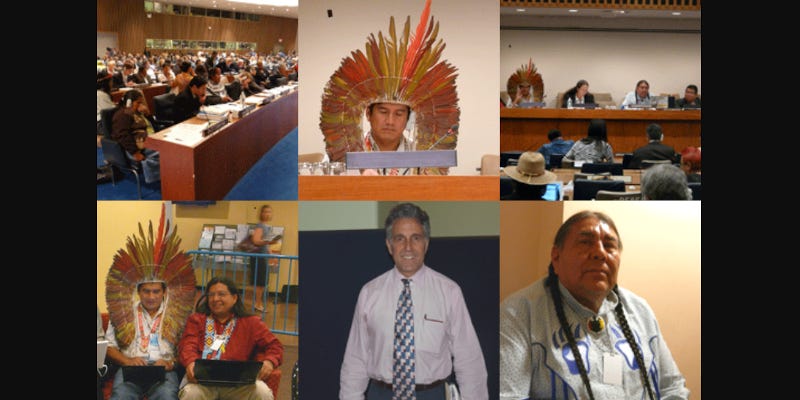Indigenous Peoples on REDD: “REDD is only made for corporations”

In May 2009, Indigenous Peoples from around the world met in New York for the 8th UN Permanent Forum on Indigenous Issues. The radio programme “Living on Earth”, which airs on National Public Radio in the USA, produced a programme looking at REDD, based on interviews with some of the Indigenous People at the Forum.
Living on Earth also interviewed Charles McNeill of the UNDP who talks about “walking the talk” but drops the “s” on Indigenous Peoples.
Below are extracts from the programme. You can listen to the programme here.
Juan Carlos Jintiach, Executive Co-director of Amazon Alliance: If you bring this concept of REDD to the Indigenous leaders they don’t know what you’re talking about. When we ask, what do you think about REDD – we’re talking this and this, so people say REDD is maybe red color or REDD may be something to do with fishing. So there’s no understanding this concept.
[ . . . ]
Tom Goldtooth, Executive Director of the Indigenous Environmental Network: What’s happening is that in this whole market system is that it’s put a market value on traditional people and traditional teachings. Those things that we hold sacred to our people. This is evil at it’s worst. They’re trading air that is sacred. We’re looking at some spiritually profound values that people of industrial society really have a difficult time grasping. So when we talk about commodities – whether it’s the sacredness of trees, and especially air now – is in order to trade CO2, in order to trade greenhouse gases—this is air—is they have to define it as a property. It’s a property. Someone has to own the air in order to trade it. Very fundamental. So, the question is: who owns the air then?
Bruce Gellerman, Living on Earth: And who owns the forests? And who gets the money that’s paid to preserve trees? Under a plan to pay to protect tropical forests -billions –perhaps even trillions of dollars in carbon credits will be bought and sold. International lending organizations like the World Bank are playing a major role in developing the REDD mechanism.
But Indigenous leaders denounced the organization’s human rights record. And during the UN Indigenous Forum protestors marched on Peru’s Consulate General.
The Peruvian government recently passed a law making it easier to buy land in the Amazon, land Indigenous people of the forest say is theirs. Tribal members blocked oil pipelines, rivers and highways, demanding the law be changed. Peru’s president declared a state of emergency.
Egberto Tabo of Peru led the protest. He’s head of the Amazon Basin Indigenous People’s Organization. Tabo says he’s profoundly concerned about the proposed REDD forest plan because it threatens the Indigenous peoples’ rights. As the market price for forests increases he warns, there will be a land grab – a green gold rush for the rights to possess the carbon locked in tropical trees.
Egberto Tabo Chipunavi, General Coordinator of the Amazon Basin Indigenous People’s Organization (COICA): REDD is only made for corporations. We’re the landowners. We’re worried abut REDD. It’s not fair. We are the ones living in the jungle. We haven’t been taken into account in the design of REDD. Again, we will be the victims of the violation of the rights of Indigenous People.
[ . . . ]
Charles McNeill, Environment Programme Team Manager, UN Development Programme: It’s true that they [Indigenous Peoples] are not sitting around the table with governments in the UN Framework Convention on Climate Change; but what is encouraging is that the voice and impact and influence, I would say, of Indigenous People has grown tremendously. It’s one of the most encouraging things I’ve seen, that every government, every donor, every NGO, every foundation working in this space is at least alluding to, referring to, talking the talk in terms of Indigenous issues. Now, the issue is walking the talk and that’s where we’re about to embark ourselves.
Gellerman: In March, the UN body coordinating REDD negotiations granted Indigenous people a voting seat on their panel where decision making is by consensus. Charles McNeill says despite the many challenges, a REDD method for preventing deforestation is the only way to rapidly stabilize global greenhouse gas emissions.
McNeill: If REDD weren’t so important I would have nothing to do with it because it’s so complex technically, politically, economically socially. But the only way out is through and to deal with REDD you’re going to have to deal with governance, you’re going to have to deal with poverty, you’re going to have to deal with human rights, equity, all the issues have to come to the fore to get this to work. As I say, it’s the most difficult challenging thing on Earth to be working on, and yet we can’t avoid it.
Gellerman: Indigenous leaders say industrial nations caused the climate crisis and before they’ll promise to go along with a REDD forest preservation scheme, developed countries will have to make deeper cuts in their greenhouse gas emissions.




